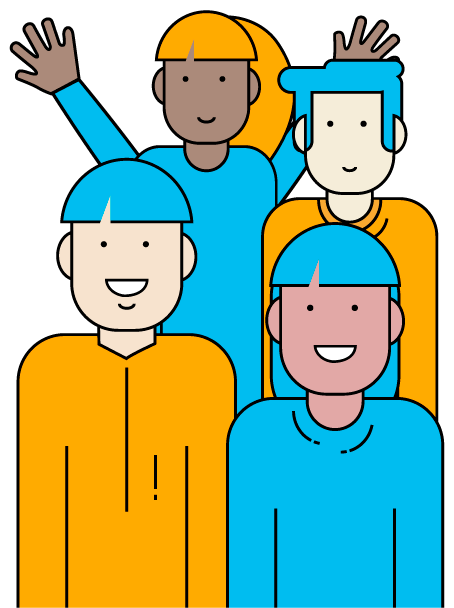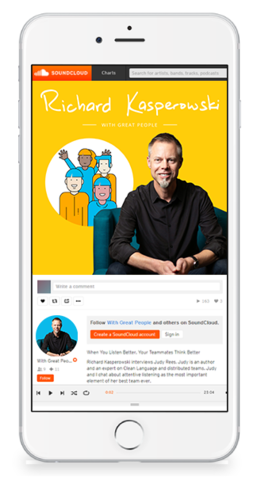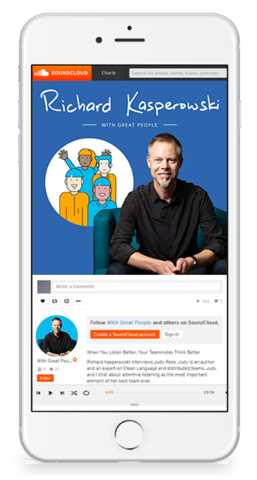Categories
Richard Kasperowski: How to Increase Success with Simple Team-Building Tools?
In this episode, Richard Kasperowski answers the questions! Back in March 2019, I was a guest on the radio show Morning Affair with Mark Bishop at 1030 KVOI-AM The Voice in Tucson, Arizona. We talked about team– building techniques in the IT industry, the importance of team-building and challenges to it, and about my personal path in researching high-performance teams.
How to Increase Success With Simple Team-Building Tools?
with Richard Kasperowski


TRANSCRIPT
Richard : (00:10) Hi friends. Welcome back to With Great People, the podcast for high-performance teams. I’m Richard Kasperowski. In this episode, the tables turn and I’m the one who answers the questions. Earlier this year, I was a guest on the radio show Morning Affair with Mark Bishop at 1030 KVOI-AM The Voice in Tucson, Arizona. Mark and I talked about team- building techniques in the IT industry, the importance of team-building and challenges to it, and about my personal path in researching high-performance teams. You know, the usual stuff. Only this time, I’m the one in the hot seat. So take a listen and I hope you enjoy it. To support this podcast, visit my website, kasperowski.com. Thanks for listening.
Richard : (00:10)
Hi friends. Welcome back to With Great People, the podcast for high-performance teams. I’m Richard Kasperowski. In this episode, the tables turn and I’m the one who answers the questions. Earlier this year, I was a guest on the radio show Morning Affair with Mark Bishop at 1030 KVOI-AM The Voice in Tucson, Arizona. Mark and I talked about team- building techniques in the IT industry, the importance of team-building and challenges to it, and about my personal path in researching high-performance teams. You know, the usual stuff. Only this time, I’m the one in the hot seat. So take a listen and I hope you enjoy it. To support this podcast, visit my website, kasperowski.com. Thanks for listening.
Mark: (01:04)
Good morning, everybody. Welcome to Monday, the 18th of March, 2019. Now what characteristics are common to high-performing teams? My next guest on A Morning Affair, Richard, is an author, speaker, teacher, coach, his high-performance teams that he does coach. He lives in Boston and he teaches about teamwork, and he does this at Harvard. And he’s on the line and he started programming when he was a kid with a home computer, and then his neighbor taught him how to do it. Is that right, Richard?
Richard : (01:34)
Hey, Mark. Yeah, that’s exactly right. Back then, I call it olden days, back in the olden days, that was unusual. So I had a little home computer. My next-door neighbor was really a great mentor. A great, great person in my life.
Mark: (01:49)
Oh. Well you have good timing for you then, because you didn’t have a clue until he showed you, right?
Richard : (01:55)
Absolutely. He was a wonderful man. I really miss him.
Mark: (02:00)
Well, you’ve worked yourself up now to where you were a manager. That’s when you started getting interested in how to manage teams for the best productivity. You say, Richard, this is Richard Kasperowski. Did I pronounce that correctly?
Richard : (02:13)
Yeah.
Mark: (02:13)
Okay.
Richard : (02:14)
Absolutely.
Mark: (02:14)
You say, Richard, that the old system of manufacturing was based on limited resources such as coal or steel. And the problem is that in the information industry, there’s no limits of ideas. So you can’t use the same team-building techniques. Please explain that.
Richard : (02:32)
Yeah. So I guess back in olden days, again, it’s another way to start the story. Just starting in the industrial revolution, the late 1800s, we were exploring new ways or our predecessors were exploring new ways of managing. They had new organizations, they had new scale organizations, maybe hundreds, maybe thousands of people. And they’re trying to figure out how to manage both the people and the raw materials. And if you read some management literature even today, they’ll say that the job of a manager is to maximize the efficient use of limited resources. Right? And so back then, we really did have limited resources. If I had a pound of coal, that meant that you didn’t have that pound of coal. If I had a ton of steel, that was my ton of steel. It wasn’t yours. And the ways that people figured out to manage factories, to manage the industry back then, it totally made sense. But things are different today.
Mark: (03:31)
Okay. So what is the other issue?
Richard : (03:35)
Yeah, so in today’s world, in today’s economy, a lot of it is based on ideas. It’s based on creativity. Think a radio show, maybe. Think software development companies. We’re building things from people’s minds. And it turns out there’s no limit on people’s good ideas. If I have a good idea, well it actually means you can have a good idea, too. It’s not like I took away your good idea, there’s a limit on good ideas. And the challenge for this new kind of company, this new way of working, is how do we get people and their good ideas together so that everybody’s good ideas are heard. So that we can collect everybody’s intelligence on a team or in a company, and not just add it up, but multiply those intelligences together to get a group genius.
Mark: (04:26)
Mm-hmm (affirmative). So is this why you started team-building and to do the research on the high-performance teams?
Richard : (04:33)
Exactly. So growing up, I grew up as a software developer. This was the first real job that I had and I was good at it. After a while it seems like I could do anything writing code. And because of that I rose in the companies I was working at. I rose as a leader, I rose as manager and director of teams, teams of teams. And then for me the question was, or the more interesting thing was not how could I be my best, but how could we be our best?
Mark: (05:06)
Mm-hmm (affirmative). There’s this mystique around, for me anyway, around programmers. There’s something special. That’s not the correct word I’m looking for, but unique. Programming is what? Concentrated thinking of understanding a language. Yes?
Richard : (05:26)
Yeah. I was thinking about this this morning, my stepson is interested in this now. He just registered for a new course in his high school on computer programming and I would liken it to writing a book. Except in this case, the reader of what you’re writing is a computer. You have to be so precise that there’s no room for misunderstanding when you’re writing code. The computer is going to do exactly what you told it, in some weird language that’s like English, but really not at all.
Mark: (05:56)
Right. Now your work is based on the research of Jim and Michele McCarthy. Can you share with us, Richard, please, who they are?
Richard : (06:06)
Yeah. Okay. So Jim and Michele McCarthy, they are two team-building experts. They had some great experiences working with teams at Microsoft, a well-known software company back in the mid 1990s. They left Microsoft and they started up what they described as a team research laboratory. They watched teams at work in their lab and they, as Michele says, it’s like a Jane Goodall. Remember Jane Goodall, watching the-
Mark: (06:36)
The gorillas, yeah.
Richard : (06:37)
In the wild? So just writing down, noticing their behaviors. So this is what Jim and Michele did. They watched teams in the wild, so to speak, and they noticed what they were doing. And they wrote down their behaviors in a way that for the teams that were successful, say they made it so that other people could imitate the behaviors of successful teams and get their own successful teams.
Mark: (07:01)
Okay, so. Well, I guess it’s an obvious question. Why are teams important?
Richard : (07:07)
Yeah, why are teams important? Well, I grew up doing individual work and really it turned out that work I was doing, I couldn’t do it myself. We had groups of people doing it together. And then there’s all these hero myths that some heroes, Steve Jobs or somebody invents a computer by himself. Well, he actually didn’t do it by himself. He had a teammate with him. There’s so many big problems that no one person can solve today. Even 10 or 15 years ago, people were working to decode the human genome. That wasn’t one person, that took 20 research institutes and hundreds or thousands of people. And there’s so many great, big, hairy problems of our time. Climate change, for example. And what I’m hoping for is that through this kind of work, we can help people organize themselves to work together more effectively to solve these sorts of problems that no one human could possibly solve on their own.
Mark: (08:01)
Mm-hmm (affirmative). So do you think the best teams are the smartest teams?
Richard : (08:05)
Oh, that’s an interesting question. It depends on what you think, what you mean by the smartest teams. If you think that’s the team with the smartest individuals, well not necessarily.
Mark: (08:16)
No. Right.
Richard : (08:16)
There’s a lot of research about this. It’s not just that you have the smartest individuals, it’s that you have people with enough intelligence and enough skill, enough confidence and they have the skill to be able to collaborate well together, to work well together.
Mark: (08:30)
Why do you think it is so hard though, to get teams to work together?
Richard : (08:37)
Yeah, I think this might begin when we’re kids and we’re in school. When we’re in kindergarten, we do things together in school. We sing songs, we play games. But as we get older, our teachers teach us to work individually. And in fact when we do try to work together, we get punished for it. They call it cheating.
Mark: (08:56)
That’s it. That’s it. You’re taught to be solo and survive on your own, aren’t you?
Richard : (09:03)
You got it. And then we take this into our work culture and at most companies, people get rewarded individually for the work that they did in comparison to the others that they’re working with. So it really becomes a limited resource thing. To get the pay raise, I have to be better than you, which means we’re competing against each other versus working together.
Mark: (09:25)
That’s right. Let’s talk about the Agile Training that Dr. Dave Cornelius brought to town on this workshop here, which has roots in manufacturing and then software development, because you came out of that world. You’re part of the Agile Training network. You actually came here to teach about teams at the Agile Conference, which was put on by Dr. Dave Cornelius. Correct?
Richard : (09:48)
Yeah, you got it. So I was in Tucson last week at a conference that Dr. Dave Cornelius produced. It was called Agile Open Arizona. We had a group of people come together who are interested in Agile product development, Agile software development. It’s a way of working that is this post-industrial way of working. It’s a way of working that values individuals collaborating well with each other, over individuals competing against each other. And so I taught my team-building master class the day before the conference started. We had a nice group of people in class and I shared some of these ideas. And not just sharing the ideas, the concepts, the theories behind great teams, team-building, high-performance teams. But the exact steps to get that, things that people in class could take back to their work team the next day.
Mark: (10:39)
So learning a new programming language doesn’t have to be hard. Okay. You say that should be the case, but what’s the downside? So the thinking of that?
Richard : (10:55)
Well, so you’re right, learning a new language doesn’t have to be hard. I joke about this with human languages. I’m obviously I’m pretty good at English. I’m studying Spanish a lot and I joke about learning new languages. Even Spanish, it really isn’t that hard. Even three-year-olds can speak Spanish, right?
Richard : (11:14)
And the same thing with computer programming languages. I run a coding dojo. It’s a playground for kids here in Boston. And I know there’s similar things like this in Tucson and other places. It’s a playground for kids to come and learn how to write code, how to program computers. And it’s really, really fun. And it turns out it’s really, really easy. Kids can build really, really complex apps, complex games. They just have fun and it’s easy for them to learn how to do this.
Mark: (11:41)
Yeah. I read a write-up on you and the learning activity sets of short games that you do, using elements from improvisational theater. The core protocols, extreme programming, and more. It would attend well anyone who wants to create great teams and build great products. And they say that a you’ll leave after one of your dues, having embodied the essential elements of accelerated continuous team-building and the awesome maintenance. Not a bad rep.
Richard : (12:17)
Pretty good, huh? Yeah. My business coach helped me write that.
Mark: (12:18)
Listen we’ve got to take a break.
Richard : (12:18)
Thanks for capturing what we were saying.
Mark: (12:19)
I’ll be right back because I wanted to ask you some other nice heavy questions. Okay. Don’t go away.
Mark: (12:23)
It’s 10:47 on The Morning Affair and we’ll be right back.
Mark: (12:27)
My guest is Richard Kasperowski. He created and teaches the course Agile Software Development that happens at Harvard University. So he must be pretty bright, huh? You can learn a lot more with Richard’s newsletter if you’d like it. www.kasperowski.com. It’s just the one word, it’s easy. Right? www.kasperowski.com. That’s K-A-S-P-E-R as in the ghost, Casper, O-W-S-K-I.com. Very interesting. Love, friendship, high-performance teams. Where was something I wrote last night? Here it is. “When people are personally committed to working and acting in a way congruent with their truth and inner alignment, they find a context where being part of a great team is achievable. They don’t settle for a poor experience. So if you believe you can produce and create greatness, go for it, make it happen, or find somewhere else where you can make it happen.” You believe in that, don’t you?
Richard : (13:33)
Oh I totally believe in that, yeah. And I’ve had some great team experiences of my own. I’m sure everybody has. It’s just if listeners pause for a moment and think about the best team of their entire life. Maybe you pause, Mark, and do the same thing right now. Everybody’s had one of these best teams in their lives. And for me, and for a lot of people, for me for sure, it happens by accidents. We did some things on purpose, but a lot of that, that both feeling of we were a great team and the objective results that we got, those were real. And my work since then has been, how do you get that again on purpose? And how can any group of people get that best team experience again on purpose?
Mark: (14:17)
There’s a lot of coaches today out there, as you’re probably well aware. The generic format that they truly believe in is it must come from inner truth and must come from inside. You must follow that passion. I guess the word passion can represent a lot of feelings, but if you’re doing what you love to do or believe you love to do, you’re going to perform a hell of a lot better than doing something you don’t, that’s for sure.
Richard : (14:43)
Absolutely. I think yogis call this Dharma. It’s the thing that you were intended to do. I think I’ve found my Dharma, but I’m sure you have, Mark. And in my course, I call it self-awareness. It’s knowing in a deep way who you are and how you feel. What’s your emotional state in moment to moment, and what do you want the most in the world? What is the most important thing to you that you want to be moving toward? Which would be called your Dharma or your passion or your true thing, the thing that you’re working toward.
Mark: (15:18)
We’ve only got a couple of minutes, Richard. I’d like to get some of these out if I can. What about people forming cliques in the workplace? Is that a good thing or a bad thing?
Richard : (15:27)
Well, the word clique, obviously it’s negative. One of the things that we do when we’re forming teams or reforming teams inside organizations, inside work organizations or companies, we do it in a way that it’s possible for the right people to find themselves on the right team. And what I don’t mean is people who were friends and they’re excluding other people. That could happen and what will end up happening is they’ll be shutting out all the other ideas from the other people in the company.
Mark: (15:59)
Right.
Richard : (16:00)
The way we do it is imagine that you could build a bunch of, I don’t know, baseball teams or something. You’ve got empty roster spots, you’ve got particular positions that you need filled on the roster, and one of the things we do is we get everybody to write their name on a Post-it.
Richard : (16:17)
We put these rosters on big posters on a wall and people put their names in the right place. We pause and reflect on it for a moment. We see if we like that configuration of people in teams and then we make improvements on it. One of the really important things here is that people are opting in. They’re choosing the teams that they want to work on, and they’re choosing the projects or the work that they want to do. That’s one of the things that we noticed is that the best teams in the world, they’re composed of people who want to be there. Not in a cliquey way-
Mark: (16:48)
Right, right.
Richard : (16:50)
But because they’re aligned on their purpose and they want to do that together.
Mark: (16:56)
What’s the most important factor in getting a team to work at an extremely high-performance level?
Richard : (17:00)
Yeah, so there’s a lot of research on this over the last five or six decades but the two most important things from the research seems to be these two things called psychological safety and group emotional intelligence. So psychological safety is this idea that you feel safe when you’re together. There’s no feeling that you’ll be… that your job is at risk, that your next promotion is at risk if you speak up, if you say you don’t know something, if you ask for help from somebody, or if you try a new role and you’re not good at it right away. And then this idea of team emotional intelligence. It’s that we understand how we’re feeling together and we behave appropriately and we understand how people outside of our team are feeling, and how their interactions work. And we can influence things to happen the right way for us.
Mark: (17:44)
So do you-
Richard : (17:45)
So those two things. Psychol-
Mark: (17:46)
Right? Go on. Sorry.
Richard : (17:48)
Oh. So these two things, psychological safety and this group emotional intelligence, these are the sensations or the measurable things that lead to high-performance teams in the literature.
Mark: (17:59)
Right. So do your ideas about high-performance teams work in lots of other different industries? Or just in the software development?
Richard : (18:11)
Yeah, these are for any team, any group of two or more people aligned with a common goal. These work everywhere. The first time I did my master class, we did it with a group that was the board of directors of a church. Right? So this is applicable for any group of people. Oh. And I think of my family. My wife and I, we are a team. We’re a group of two or more people aligned with common goals. And it’s not like I say, “I’m doing that team thing right now, Molly. Let’s do that team thing.” It’s more like I share how I’m feeling with her and we connect together and we make sure that we’re doing our best together toward the things we care about the most.
Mark: (18:48)
There’s some interesting stuff on your website. Would you like to promote that? Your site and what’s coming up on it?
Richard : (18:53)
Yeah. So welcome everybody to visit my website. It’s kasperowski.com K-A-S-P-E-R-O-W-S-K-I.com. I’ve got a list of workshops there and you can subscribe to my newsletter. In my newsletter, I offer discounts on upcoming courses, whether they’re face to face or online. I’ve got my blog on the website so you can read various things that I’m writing, get caught up on the latest news and teams and team-building, and I’ve got my podcast there. Every month in my podcast, I introduce somebody about the best team of their life. I ask them how that felt and what listeners can do to get that best team for themselves.
Mark: (19:34)
Interesting. Interesting indeed. Now I think I’ve got time, I’ve got two minutes. Well, one minute, actually. Have you had success in retrofitting these ideas in existing teams? Or do you have to start from scratch with new teams?
Richard : (19:49)
Yeah, we’ve definitely had a lot of success both with new teams and with existing teams. And I think there are two things that it takes. One thing is that the organization leaders have to be open to this.
Mark: (20:01)
Yeah.
Richard : (20:02)
And if we start with the team of leaders, this actually works best. Get them to work together to be the best team that they can be. And then any team in the company has permission to try it out and be their best, as well.
Mark: (20:12)
Well, mate. You’ve got it down, there’s no doubt about it. It’s very interesting and what you do, and you’re getting a lot of success. So I guess we’re going to be reading more about you. Good luck with all of that. Richard Kasperowski, you’re an author, speaker, teacher, and coach of high-performance teams. And he was our guest on A Morning Affair. You teach, where do you teach again? In Boston? At tell me?
Richard : (20:37)
This school called Harvard. Yeah, I’ve got a course called Agile Software Development.
Mark: (20:41)
Okay. Alrighty. Well, thanks for giving us the time that you have. Appreciate that.
Richard : (20:45)
Thank you, Mark. It’s been a pleasure.
Mark: (20:46)
All right, mate. Thank you. Richard Kasperowski. As he says, go to dot com and have a look at his site and it’s interesting indeed about teams working together, high-performance teams. You’ve got people who are touchy, people who are geniuses, people who need handling a different way. And you can keep it, fellow. Thank you very much.
Richard : (21:12)
Hi friends. Thanks for listening. And remember, to support this podcast, sign up for my newsletter at kasperowski.com.





